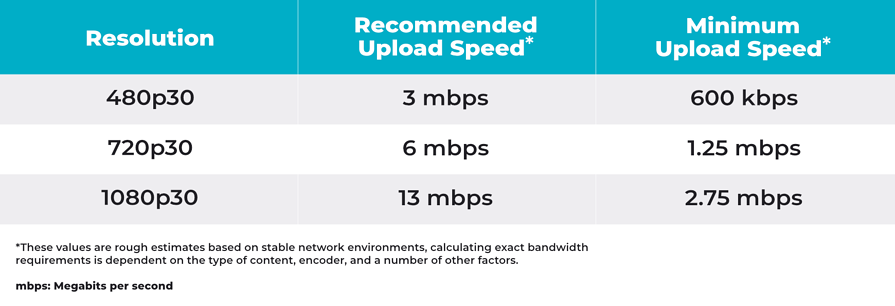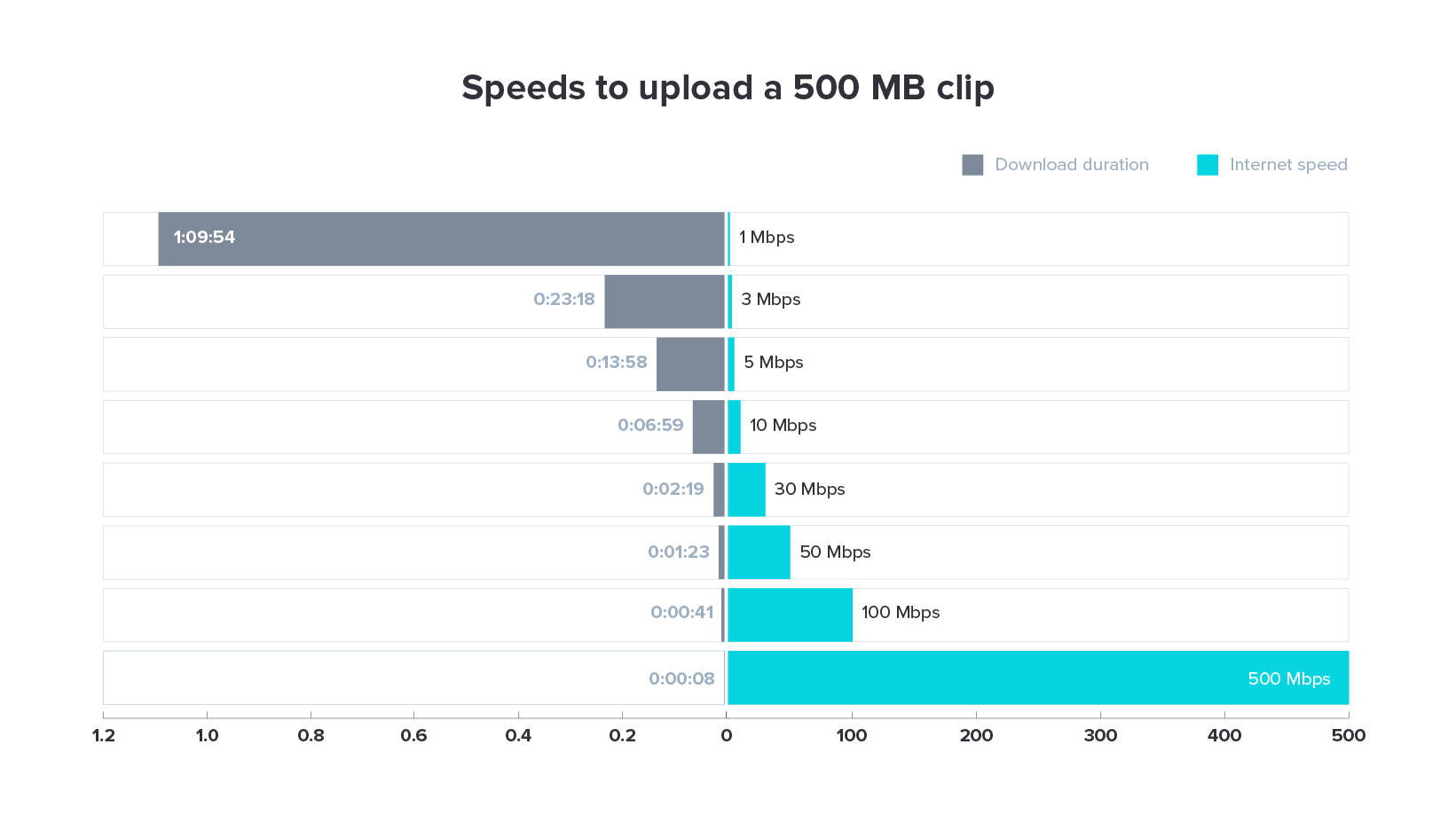How to Pick the Right Internet Plan Based on Megabits Per Second
How to Pick the Right Internet Plan Based on Megabits Per Second
Blog Article
Opening the Power of Megabits Per Second for Seamless Streaming
In today's digital landscape, the relevance of megabits per second (Mbps) can not be downplayed, especially for those looking for a smooth streaming experience. As streaming services significantly provide ultra-high-definition and high-definition content, understanding the required Mbps ends up being vital to stay clear of disruptions such as lag and buffering. Different activities demand different transmission capacities, which elevates the question of just how ideal to maximize one's home network. Exploring these aspects discloses not only the complexities of Mbps yet also functional approaches to improve your electronic interactions. What are the surprise difficulties that could be influencing your streaming top quality?
Recognizing Mbps and Streaming
When it comes to streaming material, several people may not completely comprehend the significance of megabits per second (Mbps) as an action of net rate. Mbps evaluates the rate at which information is transferred over a net connection, indicating how quickly content can be delivered to customers. This measurement is vital for streaming services, which need a consistent and appropriate transmission capacity to ensure that video and audio streams are supplied smoothly without interruptions or buffering.
Comprehending Mbps can significantly boost the streaming experience. Higher Mbps worths usually associate with far better video clip quality, enabling users to take pleasure in high-definition and ultra-high-definition content without degradation. Conversely, low Mbps might cause bad image high quality, buffering, and lag, diminishing the general watching experience.
In addition, it is vital to recognize that the actual Mbps experienced by customers can differ due to a number of factors, including network blockage, the number of tools linked to the network, and the high quality of the access provider (ISP) Hence, a thorough understanding of Mbps is vital for any individual wanting to enhance their streaming experience and delight in material effortlessly. Megabits Per Second.
Recommended Mbps for Numerous Tasks
How much data transfer do you truly need for different streaming activities? The called for Mbps can vary significantly depending on the kind of material you are consuming. For standard-definition video clip streaming, a minimum of 3 Mbps is usually adequate. If you prefer high-def (HD) material, purpose for a minimum of 5 to 8 Mbps to make sure a smooth experience without buffering.
For those who take pleasure in ultra-high-definition (4K) streaming, the needs boost significantly; a connection of 25 Mbps or higher is suggested to fit the raised data tons. In addition, if multiple tools will be streaming concurrently, it is a good idea to account for this by including extra bandwidth.
On-line gaming, while not usually related to high transmission capacity needs, still needs a trustworthy link. A minimum of 3 Mbps is generally adequate for gaming, but reduced latency and secure connections are vital.
Lastly, video clip conferencing systems such as Zoom or Microsoft Teams recommend concerning 1.5 Mbps for standard video clip top quality, though greater speeds may boost quality and lower lag - Megabits Per Second. Comprehending these needs will certainly equip users to maximize their internet connections for different streaming activities properly
Aspects Affecting Your Mbps
A number of variables can influence your Mbps and total streaming experience. The type of net connection plays a crucial function; fiber-optic his explanation links usually supply greater rates compared to DSL or cable. Network congestion is another significant aspect; during optimal usage times, shared transmission capacity can bring about decreased rates.
The range from your router likewise influences efficiency. A better distance or physical blockages, such as walls, can damage the signal strength, leading to reduced Mbps. In addition, the variety of tools connected to your network can strain data transfer, especially if numerous gadgets are streaming simultaneously.
Your option of streaming gadget matters also; older devices might not sustain greater rates or sophisticated streaming methods. The top quality of your modem and router directly impacts your net rate; obsolete tools might not provide ideal efficiency. The service strategy you subscribe to determines your optimum possible Mbps.

Tips to Enhance Your Internet Speed
Identifying the factors that influence your Mbps is the initial step toward maximizing your streaming experience. To boost your net rate, begin by reviewing your router's positioning. Placement it centrally in your home, far from blockages and wall surfaces, to maximize protection. Furthermore, take into consideration upgrading to a dual-band or tri-band router, which can effectively take care of multiple tools while decreasing disturbance.
Restrict the number of gadgets linked to your network throughout streaming sessions, as extreme usage can drain transmission capacity. Focus on wired links; making use of Ethernet cables can supply an extra steady and much faster connection contrasted to Wi-Fi.
Close unneeded programs and downloads while streaming to make certain optimal speed. By applying these approaches, you can substantially enhance your internet rate, leading to a more seamless streaming experience.

Future Trends in Streaming Innovation
As technology remains to evolve, the future of streaming is poised for significant innovations that will boost customer experience and ease of access - Megabits Per Second. With the rise of 5G networks, users can expect ultra-fast connection, lowering permitting and buffering times for high-def Visit This Link content to be streamed flawlessly. This increased data transfer will certainly allow innovative attributes such as 8K streaming and digital fact experiences, changing how audiences engage with media
Moreover, synthetic knowledge (AI) and equipment discovering are readied to play pivotal functions in material suggestion systems. These technologies will examine audience preferences more accurately, using customized web content that satisfies individual preferences, consequently boosting viewer satisfaction.
Furthermore, improvements in adaptive streaming technologies will permit real-time changes to video clip high quality based on network problems. This ensures uninterrupted viewing, no matter rising and fall internet speeds.
Final Thought
In conclusion, comprehending megabits per second (Mbps) is vital for enhancing streaming experiences across various on the internet activities. Advised Mbps worths offer advice for smooth playback, while factors affecting rate highlight the significance of network monitoring. By implementing approaches to improve net speed, users can considerably enhance their electronic interactions. As streaming technology proceeds to develop, remaining educated concerning future fads will even more boost the seeing experience, ensuring top quality content distribution in a progressively linked globe.
Understanding Mbps can substantially boost hop over to these guys the streaming experience.A number of variables can affect your Mbps and total streaming experience.Your choice of streaming device matters as well; older gadgets might not support higher speeds or sophisticated streaming methods.Identifying the variables that influence your Mbps is the initial action toward enhancing your streaming experience.In conclusion, understanding megabits per second (Mbps) is critical for enhancing streaming experiences across various on-line activities.
Report this page